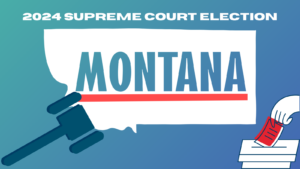2024 States to Watch: Montana

Montana Supreme Court Election
Montana elects its state supreme court justices by non-partisan election for eight-year terms. This means candidates do not have a party designation next to their name on the ballot and appear after the partisan offices for election such as senator or governor.
While the race is non-partisan, candidates may still receive support from outside groups in the form of endorsements or independent expenditures. Two justices are retiring from the court, Chief Justice Mike McGrath and Justice Dirk Sandefur. Two candidates for each seat advanced from the primary election to the general election.
Who is running:
Chief Justice
Former magistrate judge Jeremiah “Jerry” Lynch and attorney Cory Swanson are running for the chief justice seat.
Lynch began his career as a law clerk for former federal judge and Montana Supreme Court Chief Justice Paul Hatfield. Lynch worked as a private practice attorney for a decade before his appointment as a federal magistrate judge in the Montana District of the U.S. District Court. Lynch has 28 years of judicial experience he would bring with him to the bench. Lynch has also served on the Montana Board of Public Education and the Montana Board of Environmental Review. While the race is nonpartisan, Lynch has received support from groups like Montana Conservation Voters and Montana Federation of Public Employees.
Swanson began his career as an attorney in private practice in Helena, Montana after returning from deployment with the Montana National Guard. While in private practice, Swanson often had ties to conservative politics and causes. Swanson later worked as deputy attorney general under Republican Attorney General Tim Fox. He was elected as Broadwater County attorney a year later and prosecuted criminal cases. While the race is nonpartisan, Swanson has received support from the Montana Chamber of Commerce and accepted donations from the president of the Montana Family Foundation which seeks to eradicate abortion access.
Justice
District court Judge Katherine Bidegaray and Flathead County district Judge Dan Wilson advanced from the primary election.
Bidegaray began her legal career in public service working at the Montana State Auditor’s Office, first as an insurance department staff attorney and then as deputy securities exchange commissioner. Bidegaray left to work as a private practice attorney working across issues like real estate, agricultural law, oil and gas, and criminal law. She was elected in 2002 to Montana’s 7th judicial district and is now in her fourth term serving on that court. Bidegaray has also served on the Montana Supreme Court Sentence Review Division. While the race is nonpartisan, Bidegaray has received support from groups like Montana Conservation Voters and Montana Federation of Public Employees.
Wilson began his legal career working as a prosecutor for six years. Then Wilson went into private practice maintaining a diverse legal practice ranging from contract disputes to estate planning and property law. Wilson was elected to the Flathead County court in 2017. While the race is nonpartisan, Wilson has received support from the Montana Chamber of Commerce and accepted donations from the president of the Montana Pro-Life Coalition.
The stakes
Montana has one of the most unique and protective constitutions in the country. It guarantees unique rights like the right to a “clean and healthful environment” or the right to “free and open” elections and see the right to privacy as “essential to the well-being of a free society.” The Montana Supreme Court is the state’s court of last resort, meaning only it can decide which of your constitutional freedoms it will uphold. As a result, the court has delivered groundbreaking decisions for personal freedom, public lands, access to elections, and more.
Just this year, the Montana Supreme Court struck down two laws passed by the legislature it found would disenfranchise Indigenous voters in Western Native Voice v. Jacobsen. Native American voters often rely more heavily on Election Day registration and ballot assistance due to living on rural and often remote reservations. In a different case, the court also protected young people’s ability to vote. The court again upheld Election Day registration. It also ensured students’ access to the ballot by upholding student ID as a valid photo ID.
Just this year, the court delivered multiple decisions defining reproductive health care and what access to that health care looks like. A 6-1 majority on the court ruled that a ballot measure attempting to codify the right to abortion in the state court may appear on the ballot. The court also upheld abortion rights for minors, finding that minors did not need parental consent prior to obtaining an abortion. The court also struck down a law barring registered nurses from providing abortion care.
One of Montana’s most revered characteristics is its abundant natural resources and wildlife. Montana’s constitution protects its natural waterways and mandates “waters within the boundaries of the state are the property of the state for the use of its people.” As a result, the court delivered multiple decisions cementing residents’ right to access public lands and streams over private ownership that hinged on that clause. Most recently, the constitution’s provision mandating the right to a “clean and healthful environment” has been in the news because 16 young people sued the Montana state government for their use of fossil fuels and the resulting impacts that usage had on the environment and climate change. The court allowed the group’s case to move forward and blocked a stay on a lower court decision siding with the youth.
However, as a result of these decisions, the conservative-controlled state legislature attempted to exert increased oversight and control over the court. The court acted independently and upheld the Montana Constitution in every decision it delivered. Now, it is more critical than before to understand the state supreme court’s power and function so you can help shape democracy, public lands, access to health care, and more across Montana.

